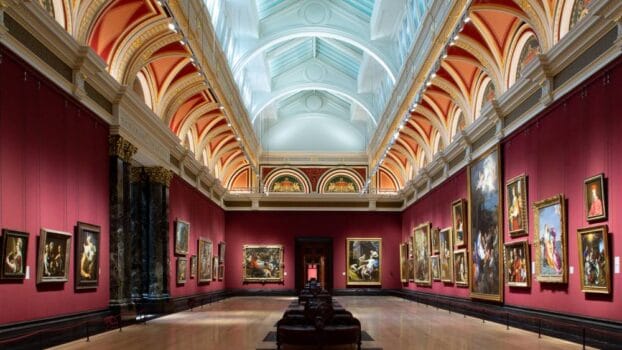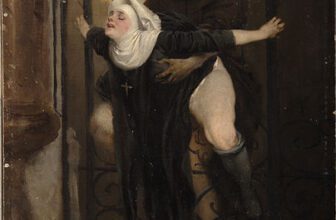London’s National Gallery: A Treasure for Fine Art Enthusiasts
London is a city renowned for its history, culture, and world-class attractions. Among its many treasures, The National Gallery in Trafalgar Square stands as one of the most significant destinations for fine art enthusiasts worldwide. Housing over 2,300 works of art that span centuries of European history, the Gallery is not just a museum but a living journey through the evolution of Western art.
For travelers, culture seekers, and art lovers, the National Gallery offers a profound experience: an opportunity to stand face-to-face with masterpieces by da Vinci, Van Gogh, Turner, Monet, Rembrandt, Botticelli, and countless others. In this article, we’ll dive deep into the story, highlights, and visitor experience of the National Gallery, plus share travel tips, affiliate-relevant resources, and booking suggestions to help you make the most of your visit.
A Brief History of the National Gallery
The National Gallery was founded in 1824, starting with a modest collection of 38 paintings purchased by the British government. Unlike private collections or specialized museums, the Gallery was envisioned as a public institution: a place where art would be freely accessible to all citizens, regardless of wealth or class.
Initially housed in a townhouse on Pall Mall, the collection quickly outgrew its home. In 1838, the Gallery moved to its current location in Trafalgar Square, where the grand neoclassical building designed by William Wilkins became an iconic London landmark. Over the decades, expansions and renovations have created a space capable of displaying one of the most comprehensive collections of Western art in the world.
The mission of the National Gallery remains unchanged today: to preserve, study, and display works of art for the enjoyment and education of the public.
Why the National Gallery is a Must-Visit
1. A Vast Collection Spanning Centuries
The Gallery’s collection covers European painting from the 13th to the early 20th century, offering an unparalleled timeline of artistic achievement. From early religious altarpieces to Renaissance humanism, from Baroque drama to Impressionist light and color, the Gallery illustrates the very fabric of Western visual culture.
2. Masterpieces by Legendary Artists
Few places in the world allow you to stand in front of works by Leonardo da Vinci, Vincent van Gogh, Claude Monet, Diego Velázquez, Raphael, and J.M.W. Turner, all in one building. For art enthusiasts, this is a dream come true.
3. Free Admission
Unlike many world-class museums, entry to the National Gallery is completely free, making it an accessible cultural treasure for all. Special exhibitions may carry a fee, but the permanent collection can be enjoyed without spending a penny.
4. Central Location in London
Situated in Trafalgar Square, the Gallery is at the heart of London. It’s easily combined with other attractions such as Covent Garden, Westminster, or the British Museum.
Highlights of the Collection
While every visitor’s journey will be unique, here are some of the most celebrated works housed in the Gallery:
Leonardo da Vinci – The Virgin of the Rocks
A masterpiece of Renaissance art, showcasing Leonardo’s skill in chiaroscuro and naturalistic detail.Vincent van Gogh – Sunflowers
One of Van Gogh’s most beloved works, radiating the energy and vibrancy of the Post-Impressionist era.J.M.W. Turner – The Fighting Temeraire
A poignant and symbolic painting reflecting Britain’s naval history and Turner’s mastery of atmosphere.Claude Monet – The Water-Lily Pond
An icon of Impressionism that captures light, color, and fleeting beauty in Monet’s signature style.Diego Velázquez – The Rokeby Venus
A rare surviving female nude by the Spanish master, blending sensuality with sophisticated technique.Hans Holbein the Younger – The Ambassadors
Packed with symbolism, perspective, and Renaissance intellect, this double portrait remains one of the most studied paintings in Western art.Jan van Eyck – The Arnolfini Portrait
Celebrated for its meticulous detail, this Northern Renaissance painting has fascinated scholars for centuries.
These highlights represent only a fraction of the masterpieces you’ll encounter in the Gallery’s halls.
The Visitor Experience
Layout and Galleries
The National Gallery is divided into four wings, organized roughly chronologically:
Sainsbury Wing – Early Renaissance (1250–1500)
West Wing – 16th century masters
North Wing – 17th century highlights
East Wing – 18th to early 20th century works
This layout allows visitors to follow the progression of European art, from medieval devotion to modern experimentation.
Tours and Guides
Visitors can choose from:
Free guided tours offered daily
Audio guides available for a small fee
The Gallery’s mobile app, which offers interactive maps and expert commentary
For those planning in advance, several travel platforms (affiliate-friendly options like GetYourGuide, Tiqets, or Viator) offer skip-the-line passes for special exhibitions or guided tours that combine the National Gallery with other London landmarks.
Facilities and Accessibility
The Gallery is wheelchair-accessible, with free cloakrooms, baby-changing facilities, and quiet spaces. A shop and café provide opportunities to rest and bring a piece of the experience home.
Tips for Visiting the National Gallery
Best Time to Visit: Early mornings and weekday afternoons tend to be quieter.
Allow Enough Time: A full visit can easily take 3–4 hours if you want to explore thoroughly.
Use the Map: With over 2,000 works, the collection can feel overwhelming. Grab a free map or download the app to plan your route.
Book Special Exhibitions in Advance: Popular temporary exhibitions often sell out quickly.
Combine Your Day: After the Gallery, explore Trafalgar Square, the National Portrait Gallery (next door), or walk down Whitehall to Westminster.
The National Gallery in Context: Why It Matters Today
The National Gallery is not just a collection of paintings, it is a space where history, culture, and identity intersect. In a world where digital images are everywhere, the act of standing in front of an original masterpiece is profoundly moving.
The Gallery plays a vital role in:
Education – Inspiring students and scholars
Cultural diplomacy – Lending works to international exhibitions
Public enrichment – Hosting talks, workshops, and family activities
For art lovers, visiting the National Gallery is not merely sightseeing, it’s an encounter with the human spirit across centuries.
Nearby Attractions Worth Visiting
If you’re planning a day in central London, pair your visit with these nearby attractions:
National Portrait Gallery (next door) – A visual history of Britain through portraiture
Covent Garden – Shops, theaters, and street performances
British Museum – Home to treasures like the Rosetta Stone
Westminster Abbey & Big Ben – A short walk away
Theatre District (West End) – For an evening show after your cultural day
Practical Information for Visitors
Location: Trafalgar Square, London WC2N 5DN
Opening Hours: Typically 10am–6pm, with extended hours on Fridays
Admission: Free for the permanent collection; fees apply for special exhibitions
Nearest Tube Stations: Charing Cross, Leicester Square, Embankment
A Living Treasure of Art
For fine art enthusiasts, history lovers, and curious travelers alike, London’s National Gallery is a must-visit destination. With its vast collection, iconic masterpieces, and free admission, it embodies the idea that art belongs to everyone.
Whether you’re marveling at Van Gogh’s Sunflowers, reflecting on Turner’s Fighting Temeraire, or exploring early Renaissance gems, the National Gallery offers a journey through human creativity like no other.
If you’re planning your trip to London, make sure to add the National Gallery to your itinerary. And if you want to enhance your visit, through guided tours, cultural passes, or nearby hotel stays, consider exploring the affiliate-linked resources that can turn your art-inspired trip into an unforgettable experience. Image/ national gallery




